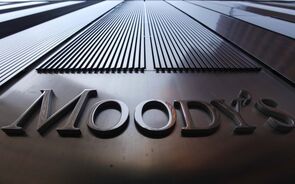Stock Market Faces Challenging Season (artigo)
1 Mensagem
|Página 1 de 1
Stock Market Faces Challenging Season (artigo)
Stock Market Faces Challenging Season
Saturday September 20, 7:24 am ET By Dick Satran
NEW YORK (Reuters) - The stock market rally of 2003 is facing one of its biggest challenges this year as it prepares to hurdle a quarterly corporate earnings season with high expectations strapped to its back.
With the economy still huffing and puffing, that might not be as easy as analysts have been expecting.
"The third quarter is the key reporting season -- it's the reality check," said Sam Stovall, chief investment strategist for Standard & Poor's.
In a sign that not every company is performing up to investors' optimistic outlooks, DuPont Corp., a leading blue-chip company and one of the 30 Dow Jones industrials, said during the week that it will not make its numbers for the quarter ending Sept. 30.
The market has been rising to big gains at least partly in anticipation of a sustained earnings rebound. Since October of last year, the Dow Industrials and S&P 500 have both climbed more than 30 percent. The Nasdaq has soared 70 percent.
"Something has to justify this advance," Stovall said, "and that means we need to see improved earnings."
So far, Stovall says, the stock gains have been "right on expectations," reflecting a solid upswing in earnings this year.
LOW QUALITY EARNINGS
But peeling back a layer, earnings so far have been "low quality," analysts say -- not the kind that comes from a surge of new business, but the kind that comes from layoffs and other cost cuts, as well as special items like asset sales.
Also take out surging energy prices and the dollar's drop, which boosts foreign earnings, and gains are tepid.
"We'd like to see more demand for real goods," said Jack Caffrey, equity strategist at JP Morgan Private Bank. "The sense is that things are improving, but it's not really happened yet. There's a disconnect there."
The poster child for the market of '03 is the technology sector. It's seen phenomenal price gains over the past year, and stratospheric earnings rebounds.
But in the case of tech stocks, higher stock prices and higher profits are a measure of how bad things were, not how good they've become. Stock prices have bounced from losses of 90 percent after the dot-com collapse, and earnings have rebounded from extremely low levels.
The leaders of the tech rally, companies like Oracle Corp. (NasdaqNM:ORCL ) and Cisco Systems Inc. (NasdaqNM:CSCO), have seen almost no rise in sales even as their stock prices have nearly doubled. Their earnings have surged, but they did so on slash-and-burn cost-cutting to bring expenses in line with dismal sales.
Investors will be keeping a close eye on the tech companies for signs that sales are growing, since cost-cutting alone can't sustain a rebound much further.
Indeed, over a wide range of companies, analysts are watching to see that top-line and bottom-line growth is taking place. "We're looking for a balance," said Caffrey,
SAINTS LEAD SINNERS
Already the "pre-announcement" season is in full swing, as companies that aren't going to "make their numbers" line up to confess their sins. So far, there are more saints than sinners.
In the first two weeks of September, more companies raised their quarterly earnings forecasts than cut them, according to Reuters Research. Of 180 companies providing forecasts, 22.2 percent have been positive compared with 20 percent negative. It was a reversal of the past two years when surprises were overwhelmingly negative.
The market can keep going higher, Stovall says, as long as companies keep delivering on the promise of rising earnings.
Stocks start to get overvalued when the average price-to-earnings ratio, the per-share profit divided by the cost of the stock, goes higher than 20. Right now, stocks are well above that, at around 30 for the Standard and Poor's 500. "Valuations are relatively high," Stovall said.
If the earnings come through on plan, rising more in the next two quarters than they did in the first half of the year, the rally could have legs. The string of corporate scandals faced by Wall Street and corporate America have heightened the pressure on companies not to hype their shares.
"Managements have been cautiously optimistic as they describe their business in order to keep those expectations achievable and reasonable," said JP Morgan's Caffrey. "Companies have no interest in disappointing people."
So the expectations, high as they are, should be marked as "deliverable," say both Caffrey and Stovall. But there is a rub for individual stocks. The higher results are so heavily anticipated that everyone is expected to hit the mark. Miss and there could be trouble.
Stocks ended lower on Friday, as investors locked in gains from the previous day's rally that sent the major market gauges to their highest levels since the first half of 2002.
The Dow Jones industrial average (^DJI) slipped 14.60 points, or 0.15 percent, to 9,644.53. The broader Standard & Poor's 500 Index (CBOE:^SPX) was off 3.32 points, or 0.32 percent, at 1,036.26. The technology-laced Nasdaq Composite Index (NasdaqSC:^IXIC) dipped 3.81 points, or 0.20 percent, to 1,905.74, based on the latest available data.
For the week, the Dow rose 1.83 percent, the S&P 500 gained 1.73 percent and the Nasdaq advanced 2.73 percent.
Saturday September 20, 7:24 am ET By Dick Satran
NEW YORK (Reuters) - The stock market rally of 2003 is facing one of its biggest challenges this year as it prepares to hurdle a quarterly corporate earnings season with high expectations strapped to its back.
With the economy still huffing and puffing, that might not be as easy as analysts have been expecting.
"The third quarter is the key reporting season -- it's the reality check," said Sam Stovall, chief investment strategist for Standard & Poor's.
In a sign that not every company is performing up to investors' optimistic outlooks, DuPont Corp., a leading blue-chip company and one of the 30 Dow Jones industrials, said during the week that it will not make its numbers for the quarter ending Sept. 30.
The market has been rising to big gains at least partly in anticipation of a sustained earnings rebound. Since October of last year, the Dow Industrials and S&P 500 have both climbed more than 30 percent. The Nasdaq has soared 70 percent.
"Something has to justify this advance," Stovall said, "and that means we need to see improved earnings."
So far, Stovall says, the stock gains have been "right on expectations," reflecting a solid upswing in earnings this year.
LOW QUALITY EARNINGS
But peeling back a layer, earnings so far have been "low quality," analysts say -- not the kind that comes from a surge of new business, but the kind that comes from layoffs and other cost cuts, as well as special items like asset sales.
Also take out surging energy prices and the dollar's drop, which boosts foreign earnings, and gains are tepid.
"We'd like to see more demand for real goods," said Jack Caffrey, equity strategist at JP Morgan Private Bank. "The sense is that things are improving, but it's not really happened yet. There's a disconnect there."
The poster child for the market of '03 is the technology sector. It's seen phenomenal price gains over the past year, and stratospheric earnings rebounds.
But in the case of tech stocks, higher stock prices and higher profits are a measure of how bad things were, not how good they've become. Stock prices have bounced from losses of 90 percent after the dot-com collapse, and earnings have rebounded from extremely low levels.
The leaders of the tech rally, companies like Oracle Corp. (NasdaqNM:ORCL ) and Cisco Systems Inc. (NasdaqNM:CSCO), have seen almost no rise in sales even as their stock prices have nearly doubled. Their earnings have surged, but they did so on slash-and-burn cost-cutting to bring expenses in line with dismal sales.
Investors will be keeping a close eye on the tech companies for signs that sales are growing, since cost-cutting alone can't sustain a rebound much further.
Indeed, over a wide range of companies, analysts are watching to see that top-line and bottom-line growth is taking place. "We're looking for a balance," said Caffrey,
SAINTS LEAD SINNERS
Already the "pre-announcement" season is in full swing, as companies that aren't going to "make their numbers" line up to confess their sins. So far, there are more saints than sinners.
In the first two weeks of September, more companies raised their quarterly earnings forecasts than cut them, according to Reuters Research. Of 180 companies providing forecasts, 22.2 percent have been positive compared with 20 percent negative. It was a reversal of the past two years when surprises were overwhelmingly negative.
The market can keep going higher, Stovall says, as long as companies keep delivering on the promise of rising earnings.
Stocks start to get overvalued when the average price-to-earnings ratio, the per-share profit divided by the cost of the stock, goes higher than 20. Right now, stocks are well above that, at around 30 for the Standard and Poor's 500. "Valuations are relatively high," Stovall said.
If the earnings come through on plan, rising more in the next two quarters than they did in the first half of the year, the rally could have legs. The string of corporate scandals faced by Wall Street and corporate America have heightened the pressure on companies not to hype their shares.
"Managements have been cautiously optimistic as they describe their business in order to keep those expectations achievable and reasonable," said JP Morgan's Caffrey. "Companies have no interest in disappointing people."
So the expectations, high as they are, should be marked as "deliverable," say both Caffrey and Stovall. But there is a rub for individual stocks. The higher results are so heavily anticipated that everyone is expected to hit the mark. Miss and there could be trouble.
Stocks ended lower on Friday, as investors locked in gains from the previous day's rally that sent the major market gauges to their highest levels since the first half of 2002.
The Dow Jones industrial average (^DJI) slipped 14.60 points, or 0.15 percent, to 9,644.53. The broader Standard & Poor's 500 Index (CBOE:^SPX) was off 3.32 points, or 0.32 percent, at 1,036.26. The technology-laced Nasdaq Composite Index (NasdaqSC:^IXIC) dipped 3.81 points, or 0.20 percent, to 1,905.74, based on the latest available data.
For the week, the Dow rose 1.83 percent, the S&P 500 gained 1.73 percent and the Nasdaq advanced 2.73 percent.
-
Info
1 Mensagem
|Página 1 de 1
Quem está ligado:
Utilizadores a ver este Fórum: Bing [Bot], cali010201, iniciado1, jmmalmeida, m-m, navaldoc, PMP69 e 101 visitantes


